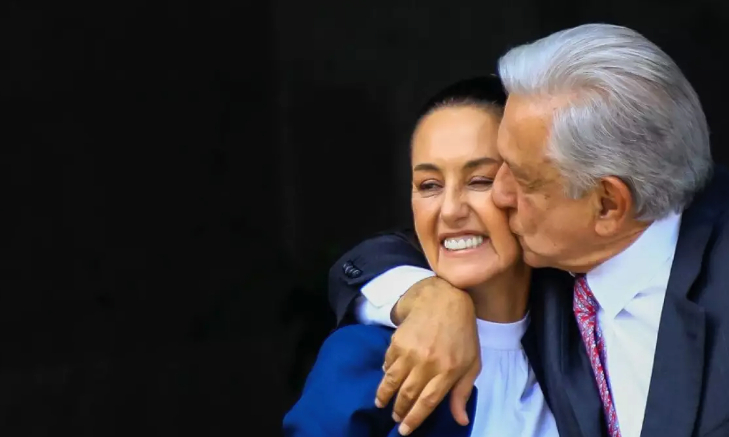There are moments in a country’s history when everything seems to happen at a frantic pace. September 2024 has been one of those moments for Mexico. Bounded by the swearing-in of the newly elected Congress on September 1st and the inauguration of the new president on October 1st, the country has been immersed in a scenario defined by three distinct yet clearly interconnected acts.
The first relates to the assessment of the outgoing president’s administration within a renewed legislative framework. The second refers to the culmination of the presidential political agenda. Finally, there are the expectations generated by the new president. All this takes place in the context of notable polarization that has been eroding democracy. The polarization stems from structural factors, but also from the actions of the outgoing president, whose daily public appearances have not only set the agenda but have established emotional patterns that have contributed to social division.
President Andrés Manuel López Obrador (AMLO) has characterized his nearly six-year term with a transformative logic he dubbed “the fourth transformation” (4T). This consists of an ambitious program to reduce poverty, mitigate social inequalities and boost public works in two key areas: communications (an airport near Mexico City to replace another project already underway and a railway in Yucatán) and energy (an oil refinery). Additionally, there was a certain republican austerity reflected in the elimination of unnecessary public offices, a low level of external projection and the reduction of official spending. However, despite these efforts, the current fiscal deficit stands at nearly 6% of GDP, the highest in the last 35 years.
More than five million people have risen out of poverty and two-thirds of the population view the outgoing president favorably, making him the most popular democratic leader in the region. However, from a critical standpoint, AMLO has failed to deliver on promises of reform in the areas of corruption and impunity. The fight against violence caused by organized crime, with over 100,000 disappearances, has yielded disappointing results.
According to 2024 data from the World Population Review, 14 of the 50 most violent cities in the world are in Mexico, with Tijuana and Acapulco leading the list. During AMLO’s term, 180,000 murders were committed, 30,000 more than during his predecessor Enrique Peña Nieto’s tenure and the massacre of Ayotzinapa, which occurred ten years ago in September and involved the killing and disappearance of 43 students, remains unresolved. The collision between security forces, organized crime and political-economic elites forged in previous administrations has not been dismantled by AMLO.
Fernando Barrientos has precisely summarized the poor results of AMLO’s six-year term and Ernesto Hernández Norzagaray warns of the potential precipice toward which the country is heading. On September 16th, during the celebration of Mexico’s Independence Day, around thirty municipalities canceled their patriotic celebrations due to violence. However, this circumstance was not mentioned at the main commemoration in Mexico City’s Zócalo.
Institutionally, the 4T projected an ambitious political reform plan that AMLO was unable to fully develop due to lacking the required two-thirds majority in each legislative chamber. This was the result of the 2018 and 2021 legislative elections, where, although AMLO’s party Morena won, along with its allies (the PT and the Green Party), they didn’t reach the threshold to push for change. However, in the June 2024 elections, the required minimum of deputies for reforms was reached in the Chamber of Deputies but not in the Senate.
Out of the 18 major constitutional reforms the president sent to Congress in February, only three will be part of his political legacy. The amendments to the Constitution regarding the Judiciary, indigenous peoples’ rights and full control of the National Guard by the military were the only ones approved by both chambers and the majority of state legislatures, as required by the Constitution, before October 1st, when the new federal administration begins. The rest will remain on hold. To move forward and given the lack of a qualified majority in the Senate, despite Morena and its allies controlling an unprecedented number of deputies (364 out of 500) and senators (83 out of 128) as well as 21 federal states, old tactics had to be revived to sway opposition senators.
Thus, National Action Party (PAN) Senator Miguel Ángel Yunes Márquez stepped forward to support the first government reform regarding Justice, primarily focused on the popular election of judges, followed by the other two. Yunes Márquez dramatically broke with his group when, on the day of the first vote, he requested a leave from his Senate seat due to health issues and was replaced by his father, former Veracruz governor Miguel Ángel Yunes Linares, one of AMLO’s greatest enemies. After taking his seat, Yunes Linares clashed with PAN senator and leader Marko Cortés, signaling his family’s distancing from the opposition bloc and their rapprochement with Morena, despite the severe confrontations they had during the 2018 and 2024 gubernatorial elections.
September concluded with Claudia Sheinbaum’s rise to the presidency, the first woman in Mexico’s history to do so, supported by 59.7% of the electorate in the July elections, surpassing AMLO’s 2018 result by 6.5 percentage points. Yunes Márquez has asked the opposition to stop promoting confrontation and instead pave the way for Sheinbaum’s administration, which is about to begin. “We must all contribute to ensure that she governs in a climate of stability and harmony,” he said.
Sheinbaum, a prominent technocrat who led Mexico City, is fully supported by AMLO and has made it clear that she intends to implement what she calls the “second phase of the Fourth Transformation,” a plan of continuity with some differences. This is already reflected in her cabinet, which assumes office on October 1st, mixing AMLO loyalists with figures more aligned with Sheinbaum.
In September, Morena also held its congress, where the shadow of its founder was evident in the selection of its leadership. The three most important leaders share youth and closeness to him. Outgoing Interior Secretary Luisa María Alcalde is the new party president, the second of AMLO’s four children andy López Beltrán, occupies the organization secretariat and Carolina Rangel, a former official from the government of Michoacán, is the secretary-general.
The tension between Sheinbaum’s autonomy and dependence on her predecessor will be the guiding thread of the populist presidential script now firmly established in Mexico. With the succession, September seems to have confirmed the predominance of dependence. This is indicated by their shared stance on the “Spanish issue.” Using King Felipe VI as a scapegoat for betrayal unites them both. AMLO’s populist outburst against “proud Spanish colonialism” has been enthusiastically endorsed by technopopulist Sheinbaum, who also seems uninterested in distinguishing between the role of a head of state and a government in a parliamentary system. This, despite the historically strong friendship between the Spanish and Mexican people.












